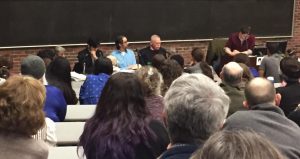Guest post from Tom Cetrino, a SUNY New Paltz Political Science alum and member of The Benjamin Center’s Advisory Board
Recently enacted legislation (A3009C/S2009C Part BBB) included a revision of Governor Cuomo’s proposal to require each county outside of New York City to prepare a plan for further sharing of service delivery responsibilities among local governments contained within the county. Each county is required to have a shared services panel that must include the chief executive of the county (typically the County Executive) who will serve as the chair, and the mayor or supervisor of every town, city, and village in the county. Additionally, the county may elect to include school districts, BOCES, and special improvement districts on the panel and in the plan.
The plan must demonstrate new recurring property tax savings by eliminating or consolidating duplicative local government services. In preparing the plan, the county must consult and seek input from the shared services panel and each collective bargaining unit with members working for the entities represented on the panel as well as community, business and civic leaders. At least three public hearings must be held on the plan.





